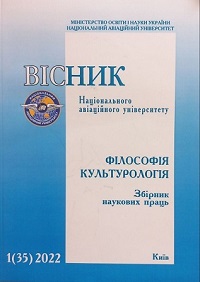CULIARITIES OF KNOWLEDGE OF NATURE IN THE EARLY STAGES OF SOCIAL DEVELOPMENT
DOI:
https://doi.org/10.18372/2412-2157.35.16538Keywords:
interaction of nature and society, ecological culture, ecological imperative, ethno-ecological systems, individual and collective being, worldview, traditional societyAbstract
Introduction. The interaction of nature and society includes issues related to modern man’s understanding of the scientific foundations of rational environmental management and the inclusion of environmental issues in the structure of the individual's value imperative. The aim and tasks are to analyze the cultural and ecological dimensions of individual and collective existence at the early stages of social development. Research methods. include the dialectical approach in understanding the interaction of nature and society, as well as the results of philosophical studies of the communicative aspects of cognition and the spiritual and practical interaction of the cognizing subject with the objective world. Research results. At the heart of the relationship of traditional societies with the environment in their specific practical-activity aspect was the non-difference of being in the form of non-differentiation and poor technical equipment of labor, which gave rise to the non-difference of social and individual consciousness. Significant dependence of an individual of a traditional society on nature led to the formation of various geographically determined ethno-ecological systems, within which the basic principles of ecological culture were formed. Discussion. Ethno-ecological systems are cultural and historical types formed in various environmental conditions. The ecological culture of traditional societies performed the functions of a means of self-organization and regulation of the balance in the "man-biosphere" system, having the potential for cultural adaptation of human groups to changing environmental conditions in the context of the sustainable development strategy. Conclusion. The cultural and ecological foundations of human being in traditional societies in their specific practical and activity dimensions were determined by several basic principles: the non-diffusion of social being and the associated non-diffusion of social and individual consciousness, its religious and mythological nature. An important component of the substrate-procedural basis for the development of the environment was ecological culture, which, in the conditions of traditional society, performed regulatory functions in ensuring rational nature management and maintaining stability in the "man-biosphere" system.
References
Human Ecology: Contemporary Research and Practice. Eds.: D.G. Bates, J. Tucker. NewYork (NY): Springer, 2010. – 377 p.
Бромлей Ю. В. Современные проблемы этнографии / Ю. В. Бромлей. – М.: Наука, 1981. – 393 с.
Буряк В. В. Динамика культуры в епоху глобализации: ноосферный контекст»: монографія / В. В. Буряк. – Симферополь: ДИАЙПИ, 2011. – 462с.
Вернадский Н. И. Биосфера и ноосфера / В. И. Вернадский. – М.: Наука, 1989. – 262 с.
Гиренок Ф. И. Экология, цивилизация, ноосфера / Ф. И. Гиренок. – М.: Наука, 1987. – 180 [2] c.
Голубець М. А. Від біосфери до соціосфери / М. А. Голубець. – Львів: Поллі, 1997. – 256 с.
Дротянко Л. Г. Інформаційний простір і діалог культур в інтер’єрі ХХІ століття / Л. Г. Дротянко // Вісник Національного
авіаційного університету. Серія: Філософія. Культурологія. – К.: НАУ. –№ 1 (13). – 2011. – С. 5-8.
Дубова Н. А. Этническая экология: теория и практика / Н. А. Дубова, В. И. Козлов, А. Н. Ямсков. – М.: Наука,1991. – 376 с.
Екологія і культура /за ред. В. С Крисаченка. – К. : Наук. думка, 1991. – 260 с.
Крисаченко В. С. Екологічна культура: теорія і практика: Навч. посібник / В. С. Крисаченко. – К.: Заповіт, 1996. – 352 с.
Моисеев Н. Н. Судьба цивилизации. Путь разума / Н.Н. Моисеев. – Москва: Языки русской культуры, 2000. – 223 с. – (Язык. Семиотика. Культура).
Першіц А. І. Історія первісного суспільства / А. І. Першіц, О. Л. Монгайт, В. П. Алексеев. К.: Вищ. школа, 1980. – 224 с.
Печчеи А. Человеческие качества / А. Печчеи. – М.: Прогресс, 1980. – 302 с.
Сідоркіна О. М. Особливості знання про природу на ранніх етапах суспільного розвитку / О. М. Сідоркіна // Вісник Національного авіаційного університету. Серія: Філософія. Культурологія. – К.: НАУ. – № 2 (34). – 2021. – С. 50-54.
Скиба О. П. Екологічна культура як складова духовності сучасної людини людини / О. П. Скиба // Вісник Національного
авіаційного університету. Серія: Філософія. Культурологія. – К.: НАУ. –№ 1 (33). – 2021. – С. 146-150.
Файнберг Л. А. Обманчивый рай: Человек в тропиках Южной Америки / Л.А. Файнберг. – М.: Мысль, 1986. – 173 с.
Файнберг Л. А. Охотники Американского Севера (индейцы и эскимосы) / Л. А. Файнберг. – М.: Наука, 1991. – 184 с.
Філософія ноосфери / М. О. Булатов, К. С. Малеев, В. П. Загороднюк та ін. – К.: Наук, думка, 1995. – 150 с.

